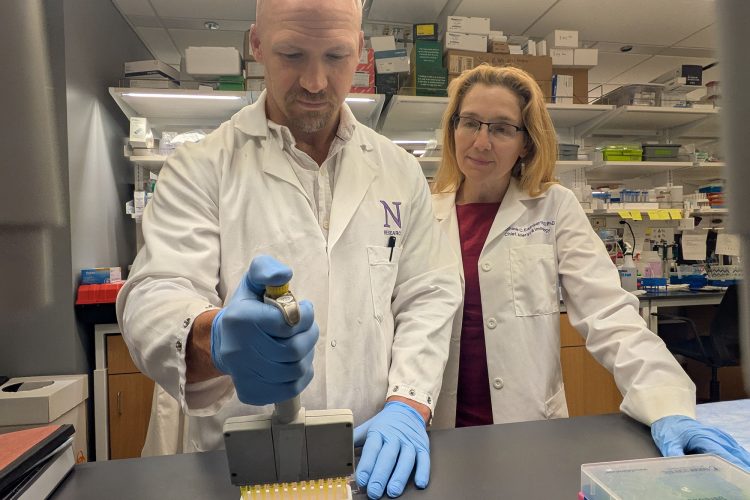Asthma drug shows strong promise as breakthrough food allergy treatment
Posted: 8 August 2025 | Ben Cornwell | No comments yet
Northwestern study finds asthma drug Zileuton nearly eliminates food-induced anaphylaxis in mice entirely by targeting a newly discovered immune pathway.


Study authors Stephanie Eisenbarth, MD, PhD, the director of the Center for Human Immunobiology, and Adam Williams, PhD, associate professor of Medicine in the Division of Allergy and Immunology, conducting allergy research in their lab. Credit: Northwestern University
Scientists at Northwestern University Feinberg School of Medicine have discovered that the asthma drug Zileuton can almost completely prevent life-threatening food allergy reactions in mice. Their findings, published on 7 August in Science, could open the door to new treatments for millions with food allergies.
The study was co-led by Dr Stephanie Eisenbarth, director of the Center for Human Immunobiology and chief of the Division of Allergy and Immunology, alongside Dr Adam Williams, associate professor of medicine (allergy and immunology) at Feinberg.
The team focused on Zileuton, an FDA-approved asthma drug, and found it effectively prevented food-induced anaphylaxis, a rapid and potentially fatal allergic reaction, in mice. They uncovered a previously unknown role for a gene called DPEP1 that controls this reaction. By using Zileuton to interrupt the pathway linked to DPEP1, the researchers reduced allergic responses in highly susceptible mice from 95 percent risk to 95 percent protection.
Dr Eisenbarth admitted it was “shocking” how well Zileuton worked.
The breakthrough came after a yearslong forward genetic screening, where researchers bred successive generations of mice to isolate the genes responsible for food allergy susceptibility. Once the DPEP1 gene was identified as controlling leukotrienes in the gut, inflammatory molecules already known to be involved in asthma, the team tested Zileuton, which blocks leukotriene production.
Dr Williams said:
This is a totally different, out-of-the-box approach to treat food allergy, unlike anything we’ve tried before.
We’ve seen tragic, even fatal reactions from hidden ingredients like ground peanuts in a sauce. For parents sending their child to a birthday party, or for anyone flying where they can’t control what’s being served, this could be a powerful protective drug.”
New path for allergy research
Food allergies affect more than 33 million people in the United States, nearly one in ten, yet predicting the risk of anaphylaxis and preventing accidental exposure remains difficult. Only two FDA-approved treatments currently exist: a peanut oral immunotherapy that may trigger reactions itself, and an expensive injection (omalizumab) that is not effective for all patients. Zileuton could offer a simple alternative, taken as a pill in advance to temporarily block the body’s anaphylactic pathway.
In July, the Northwestern team launched a small early-stage clinical trial to test whether the drug’s protective effect in mice works in humans. The findings may also help explain why some individuals test positive for food allergens but do not experience symptoms when consuming the food.
Dr Eisenbarth added:
Let’s say you’re told you’re allergic to peanuts based on a blood test, but you’ve eaten peanuts your whole life without any problems. This pathway we discovered may be one explanation for why some of those people are protected.”
That group has long posed a challenge for clinicians and caused confusion for patients, as current tests estimate allergy risk but do not confirm tolerance. She concluded:
Our findings open a whole new area for future research into how people develop food allergies in the first place, and why some react while others don’t.”
Related topics
Allergens, Food Safety, Research & development, The consumer









